8 books about Street, Anna
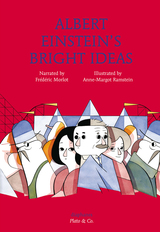
Albert Einstein's Bright Ideas
Frédéric Morlot and Anne-Margot Ramstein
Diaphanes, 2017
At its most basic, philosophy is about learning how to think about the world around us. It should come as no surprise, then, that children make excellent philosophers! Naturally inquisitive, pint-size scholars need little prompting before being willing to consider life’s “big questions,” however strange or impractical. Plato & Co. introduces children—and curious grown-ups—to the lives and work of famous philosophers, from Socrates to Descartes, Einstein, Marx, and Wittgenstein. Each book in the series features an engaging—and often funny—story that presents basic tenets of philosophical thought alongside vibrant color illustrations.
In Albert Einstein’s Flashes of Inspiration, the young Albert Einstein has a very important job: he must deliver electricity to the big Oktoberfest celebration in Munich. As he hurries from one merry-go-round to another, nothing seems to be going as planned. With his sister, Maja, Heinrich the dog, and Niels Bohr, a qualified dwarf-thrower, can he win a battle against the laws of the universe? The key just may lie in the question of whether a dumpling can fly faster than light?
In Albert Einstein’s Flashes of Inspiration, the young Albert Einstein has a very important job: he must deliver electricity to the big Oktoberfest celebration in Munich. As he hurries from one merry-go-round to another, nothing seems to be going as planned. With his sister, Maja, Heinrich the dog, and Niels Bohr, a qualified dwarf-thrower, can he win a battle against the laws of the universe? The key just may lie in the question of whether a dumpling can fly faster than light?
[more]
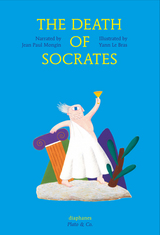
The Death of Socrates
Jean Paul Mongin and Yann Le Bras
Diaphanes, 2015
At its most basic, philosophy is about learning how to think about the world around us. It should come as no surprise, then, that children make excellent philosophers! Naturally inquisitive, pint-size scholars need little prompting before being willing to consider life’s “big questions,” however strange or impractical. Plato & Co. introduces children—and curious grown-ups—to the lives and work of famous philosophers, from Descartes to Socrates, Einstein, Marx, and Wittgenstein. Each book in the series features an engaging—and often funny—story that presents basic tenets of philosophical thought alongside vibrant color illustrations.
“Tell us, Delphic Oracle, who is the wisest man in all of Greece?” So begins The Death of Socrates. No mortal man is wiser than Socrates, who, on his daily walks through Athens, talks to all the people he meets. When the person he talks to takes himself to be very wise, Socrates asks so many questions that the person ends up admitting he knows nothing. When he runs into people who know little, Socrates sets them on the way to wisdom. But not everyone shares Socrates’s love for the truth. When the people of Athens become angry with him for his ceaseless questioning, how will he find the courage to continue to speak the truth?
Plato & Co.’s clear approach and charming illustrations make this series the perfect addition to any little library.
“Tell us, Delphic Oracle, who is the wisest man in all of Greece?” So begins The Death of Socrates. No mortal man is wiser than Socrates, who, on his daily walks through Athens, talks to all the people he meets. When the person he talks to takes himself to be very wise, Socrates asks so many questions that the person ends up admitting he knows nothing. When he runs into people who know little, Socrates sets them on the way to wisdom. But not everyone shares Socrates’s love for the truth. When the people of Athens become angry with him for his ceaseless questioning, how will he find the courage to continue to speak the truth?
Plato & Co.’s clear approach and charming illustrations make this series the perfect addition to any little library.
[more]
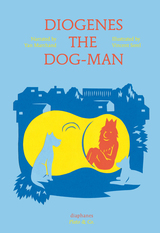
Diogenes the Dog-Man
Yan Marchand and Vincent Sorel
Diaphanes, 2017
At its most basic, philosophy is about learning how to think about the world around us. It should come as no surprise, then, that children make excellent philosophers! Naturally inquisitive, pint-size scholars need little prompting before being willing to consider life’s “big questions,” however strange or impractical. Plato & Co. introduces children—and curious grown-ups—to the lives and work of famous philosophers, from Socrates to Descartes, Einstein, Marx, and Wittgenstein. Each book in the series features an engaging—and often funny—story that presents basic tenets of philosophical thought alongside vibrant color illustrations.
In Diogenes the Dog-Man, the philosopher Diogenes not only admires the honesty of dogs, he has actually become one—sleeping, eating, and lifting his leg to pee wherever he chooses! Best of all, unlike humans, who dupe one another as to their true feelings, Diogenes the Dog-Man is free to bark his displeasure and even bite his adversaries in the calves—even if they happen to be Alexander the Great. Initially, the citizens gathered in the Agora think Diogenes is mad. Does he have rabies? But it soon becomes clear that we can all learn a thing or two from dogs about how to live a simple life.
In Diogenes the Dog-Man, the philosopher Diogenes not only admires the honesty of dogs, he has actually become one—sleeping, eating, and lifting his leg to pee wherever he chooses! Best of all, unlike humans, who dupe one another as to their true feelings, Diogenes the Dog-Man is free to bark his displeasure and even bite his adversaries in the calves—even if they happen to be Alexander the Great. Initially, the citizens gathered in the Agora think Diogenes is mad. Does he have rabies? But it soon becomes clear that we can all learn a thing or two from dogs about how to live a simple life.
[more]
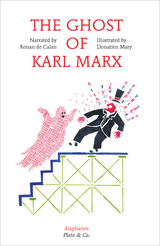
The Ghost of Karl Marx
Ronan de Calan and Donatien Mary
Diaphanes, 2015
At its most basic, philosophy is about learning how to think about the world around us. It should come as no surprise, then, that children make excellent philosophers! Naturally inquisitive, pint-size scholars need little prompting before being willing to consider life’s “big questions,” however strange or impractical. Plato & Co. introduces children—and curious grown-ups—to the lives and work of famous philosophers, from Descartes to Socrates, Einstein, Marx, and Wittgenstein. Each book in the series features an engaging—and often funny—story that presents basic tenets of philosophical thought alongside vibrant color illustrations.
In The Ghost of Karl Marx, the philosopher is saddened when the town weavers must sell their cloth cheaply to compete with machines. The farmers too cannot sell their crops and have no money to buy new seeds. Forced to leave their work, the townspeople form an angry crowd in front of the factories, but what is to be done when there are so many hungry people and so few jobs to pay for food to eat? Concealed in one of the weavers’ sheets, the philosopher makes a solemn vow to give this story a happy ending by finding the Market, that infernal magician, and ridding the town of him once and for all.
Plato & Co.’s clear approach and charming illustrations make this series the perfect addition to any little library.
In The Ghost of Karl Marx, the philosopher is saddened when the town weavers must sell their cloth cheaply to compete with machines. The farmers too cannot sell their crops and have no money to buy new seeds. Forced to leave their work, the townspeople form an angry crowd in front of the factories, but what is to be done when there are so many hungry people and so few jobs to pay for food to eat? Concealed in one of the weavers’ sheets, the philosopher makes a solemn vow to give this story a happy ending by finding the Market, that infernal magician, and ridding the town of him once and for all.
Plato & Co.’s clear approach and charming illustrations make this series the perfect addition to any little library.
[more]
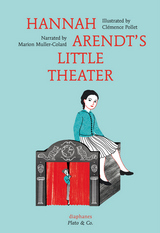
Hannah Arendt's Little Theater
Marion Muller-Colard
Diaphanes, 2016
At its most basic, philosophy is about learning how to think about the world around us. It should come as no surprise, then, that children make excellent philosophers! Plato & Co. introduces children—and curious grown-ups—to the lives and work of famous philosophers, from Socrates to Descartes, Einstein, Marx, and Wittgenstein. Each book in the series features an engaging—and often funny—story that presents basic tenets of philosophical thought alongside vibrant color illustrations.
In Hannah Arendt’s Little Theater, the philosopher Hannah Arendt is about to finish her last book, but she is sure something is missing. As she puzzles over her words, she is visited by a friend from the past—none other than her nine-year-old self! Reluctantly, she accepts young Hannah’s helping hand, joining the small blue-cardiganed girl on an adventure through the streets of New York City to a tiny theater where they watch a frightening play about a town terrorized by an evil wolf and his pack of puppets. But, even in the blackest moments, when evil seems sure to prevail, it is always possible to turn things around. Could the same be said of the “theater” of the real world, in which real people come together to create change?
Plato & Co.’s clear approach and charming illustrations make this series the perfect addition to any little library.
In Hannah Arendt’s Little Theater, the philosopher Hannah Arendt is about to finish her last book, but she is sure something is missing. As she puzzles over her words, she is visited by a friend from the past—none other than her nine-year-old self! Reluctantly, she accepts young Hannah’s helping hand, joining the small blue-cardiganed girl on an adventure through the streets of New York City to a tiny theater where they watch a frightening play about a town terrorized by an evil wolf and his pack of puppets. But, even in the blackest moments, when evil seems sure to prevail, it is always possible to turn things around. Could the same be said of the “theater” of the real world, in which real people come together to create change?
Plato & Co.’s clear approach and charming illustrations make this series the perfect addition to any little library.
[more]
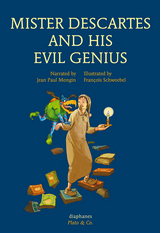
Mister Descartes and His Evil Genius
Jean Paul Mongin
Diaphanes, 2016
At its most basic, philosophy is about learning how to think about the world around us. It should come as no surprise, then, that children make excellent philosophers! Plato & Co. introduces children—and curious grown-ups—to the lives and work of famous philosophers, from Socrates to Descartes, Einstein, Marx, and Wittgenstein. Each book in the series features an engaging—and often funny—story that presents basic tenets of philosophical thought alongside vibrant color illustrations.
On a peaceful winter night while the rest of the town sleeps, Mister Descartes stays up late reading the great books of the world. Suddenly, by the light of the moon, he sees a strange and fearsome shape in the shadow of his pet parrot, Baruch. Is it an illusion, or could it be that his faithful pet is but a figment of his imagination? Could the same be true of his room and all of sleepy Holland? Quite obviously, he cannot rely on his senses, so how can Mister Descartes arrive at any certainty about the world around him? How will he determine what is a clever trick and what is real?
Plato & Co.’s clear approach and charming illustrations make this series the perfect addition to any little library.
On a peaceful winter night while the rest of the town sleeps, Mister Descartes stays up late reading the great books of the world. Suddenly, by the light of the moon, he sees a strange and fearsome shape in the shadow of his pet parrot, Baruch. Is it an illusion, or could it be that his faithful pet is but a figment of his imagination? Could the same be true of his room and all of sleepy Holland? Quite obviously, he cannot rely on his senses, so how can Mister Descartes arrive at any certainty about the world around him? How will he determine what is a clever trick and what is real?
Plato & Co.’s clear approach and charming illustrations make this series the perfect addition to any little library.
[more]
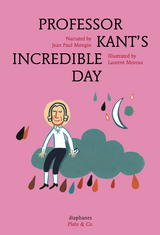
Professor Kant's Incredible Day
Jean Paul Mongin
Diaphanes, 2016
At its most basic, philosophy is about learning how to think about the world around us. It should come as no surprise, then, that children make excellent philosophers! Naturally inquisitive, pint-size scholars need little prompting before being willing to consider life’s “big questions,” however strange or impractical. Plato & Co. introduces children—and curious grown-ups—to the lives and work of famous philosophers, from Descartes to Socrates, Einstein, Marx, and Wittgenstein. Each book in the series features an engaging—and often funny—story that presents basic tenets of philosophical thought alongside vibrant color illustrations.
In Professor Kant’s Incredible Day, the philosopher Immanuel Kant wants only to be left in peace to consider life’s big questions: What can I know? What can I hope for? But, when a perfumed letter arrives one day, it interrupts his studies and sets off a series of events the dour professor could not possibly have predicted. But just when it seems as though all of Königsberg is plunged into chaos, he realizes that this perfect storm may hold the answers to his most pressing questions.
Plato & Co.’s clear approach and charming illustrations make this series the perfect addition to any little library.
[more]
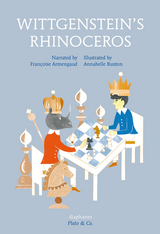
Wittgenstein's Rhinoceros
Françoise Armengaud
Diaphanes, 2016
At its most basic, philosophy is about learning how to think about the world around us. It should come as no surprise, then, that children make excellent philosophers! Naturally inquisitive, pint-size scholars need little prompting before being willing to consider life’s “big questions,” however strange or impractical. Plato & Co. introduces children—and curious grown-ups—to the lives and work of famous philosophers, from Descartes to Socrates, Einstein, Marx, and Wittgenstein. Each book in the series features an engaging—and often funny—story that presents basic tenets of philosophical thought alongside vibrant color illustrations.
“Mister Wittgenstein! Stop looking for a horned beast in the middle of a Cambridge classroom!,” an exasperated Bertrand Russell commands his pupil. But the young Ludwig Wittgenstein knows that, just because we don’t see a rhinoceros, doesn’t mean one may not be hiding where we least expect it. When war breaks out in Europe, Ludwig is recruited for a top-secret mission. Alas, no one is able to make sense of rhino-loving philosopher’s notebooks. What could he possibly mean by so many seemingly nonsensical statements?
Plato & Co.’s clear approach and charming illustrations make this series the perfect addition to any little library.
“Mister Wittgenstein! Stop looking for a horned beast in the middle of a Cambridge classroom!,” an exasperated Bertrand Russell commands his pupil. But the young Ludwig Wittgenstein knows that, just because we don’t see a rhinoceros, doesn’t mean one may not be hiding where we least expect it. When war breaks out in Europe, Ludwig is recruited for a top-secret mission. Alas, no one is able to make sense of rhino-loving philosopher’s notebooks. What could he possibly mean by so many seemingly nonsensical statements?
Plato & Co.’s clear approach and charming illustrations make this series the perfect addition to any little library.
[more]
READERS
Browse our collection.
PUBLISHERS
See BiblioVault's publisher services.
STUDENT SERVICES
Files for college accessibility offices.
UChicago Accessibility Resources
home | accessibility | search | about | contact us
BiblioVault ® 2001 - 2025
The University of Chicago Press









